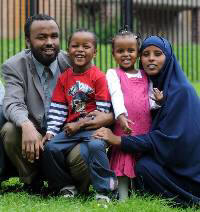|
Family Matters:
Yorkshire helping to lay the ghosts of
war-torn land

WHEN a land mine exploded in his
face in his native Somalia, Mohamed Harun Mohamoud thought his life
was over. Although he was left blind, his disability hasn't stopped
him chasing his dreams. His story is one of courage and
determination.
AS a 15-year-old Mohamed Harun Mohamoud should have been looking
forward to his final year at school.
Instead the bright teenager was living and working in a ghost town
wrecked by his country's civil war.Conflict had claimed his school,
his home, his friends and his childhood. Feeling there was little
left to live for, he took a job looking for some of the three
million landmines strewn across his devastated homeland.
"It sounds very risky, picking them up for a living but I had almost
lost everything including my home and education," recalls Mohamed,
now 33, and making a successful new life in Sheffield with his wife
and children, aged four and two.
"I had seen friends and neighbours killed. The country was ruined
and full of ghost cities. Rebel forces were fighting in the streets
and I'd been living in a refugee camp in Ethiopia for two years.
"I was from a good family. My dad was an accountant and like every
family we were deeply affected by the war. I just wanted to do
something that would save people.
"It was the only work available and for $115 a month which is about
£60 we cleared streams, fields, houses and gardens.
"We'd use a stick to dig into the earth then when we found a
landmine we'd call the section leader who would defuse it.
"One day I was digging and a mine just exploded in my face. The
flames went into my eyes and the medics refused to send me to
another country for treatment. The sub contractors who were working
for the UN weren't insured and now I realise we were exploited.
"Lots of my friends lost their lives or limbs."
Mohamoud was left totally blind and in the years that followed,
civil war returned to his homeland.
He again fled to the stark refugee camps but found love with his
wife Zeinab Jama.
After a decade of violence he made the decision to come to the UK
and left Zeinab behind in what is now Somaliland.
"I'm met Zeinab but life seemed to be going from bad to worse. I
decided to get out and come to the UK.
"In Somalia, people think that if you are blind your life is over.
Education and employment are not an option. I'd always wanted peace
and stability and although it was hard moving to Sheffield my
worries were not that great. The environment and the language were
strange and it was hard to overcome the blindness barrier but
wherever you go there's difficulties.
"It was easier than life in Somalia where all I could think about
was survival and trying to stay safe.
Mohamed would phone and email his wife and returned twice for visits
when his two children were conceived.
He didn't meet his daughter Hafsa, now two, until she came to live
in England in 2007.
"My wife used to decribe her to me but I didn't meet her until she
came to here."
Mohamed's wife and children are now enjoying their new life in
Sheffield which has a sizeable Somalian population.
He's received good support from Sheffield council, the RNIB and has
attended residential study programmes to boost his language skills.
Now, he has completed a one-year humanities access course at Castle
College, Sheffield, where he received support from the visual
impairment team.
"I am pleased with what I have achieved but there is still more to
do."
Source:The Star



|


